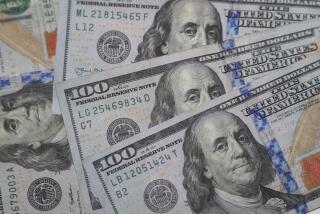Taxes and Inflation Make Savings a Loser
- Share via
Like so many politicians and other economists, David M. Gordon ignores the impact of inflation, tax policy and interest rates on personal savings, “Increased Savings Isn’t the Key to Stimulating Investment,” (July 14).
The major players currently charge me 11% to 12% for my well-secured home mortgage and 19% to 21.5% for my credit-card purchases. They know what rate it takes to come out ahead. Yet they’ll pay only 5 1/2% for my (admittedly modest) savings, and income taxes will take about 30% of that pittance. Inflation will substantially exceed the interest, meaning that even before taxes, I’ll have lost ground.
Gordon’s statement that “higher interest rates probably will also induce increased savings” means he’s discussing commercial, not personal savings. Even during Jimmy Carter’s Administration, when the prime rate was 16%, banks still paid only 5% on personal savings.
Spending is simply worth more to me in the utility of my purchases, the hedge against inflation and the psychic rewards of ownership than what little I get from saving.
Increasing taxes to curb consumption won’t change my personal equation: I still get more from spending than saving. I just won’t be able to spend as fast and my standard of living will go down.
Even if interest rates skyrocketed for personal savings, it would mean nothing unless it outpaced taxes and inflation. What good is doubling my money when prices triple? Why forgo the rewards of spending if the government, not I, enjoys the profits of savings? Better to buy the car, the stereo or the vacation while I can still afford it. Sure, I’d like to save but it’s not the smart thing to do.
Increasing the productivity of our enterprises is good, Gordon, but don’t expect it alone to change the savings of our households.
BILL NELSON
Simi Valley
More to Read
Inside the business of entertainment
The Wide Shot brings you news, analysis and insights on everything from streaming wars to production — and what it all means for the future.
You may occasionally receive promotional content from the Los Angeles Times.










